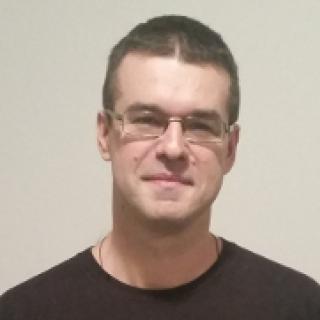Machine learning will soon have a profound effect on every industry on the planet. This revitalized wave generates huge demands and challenges for software developers with this expertise. The Practical Machine Learning track will focus on how developers can successfully build real world machine learning models based on the proven techniques using viable APIs and frameworks. Since its critical to using machine learning in our applications, we’ll also cover the best practices for collecting and preprocessing data, choosing and building models; these are some of the biggest challenges in putting machine learning in production.
Track: Practical Machine Learning
Location: Empire Complex, 7th fl.
Day of week:

Track Host: Zoran Sevarac
Zoran Sevarac is software developer, AI researcher, entreprenuer and university professor. He works at AI Lab at University of Belgrade, and he is CEO of deep learning startup Deep Netts. He is a founder of popular open source educational neural network software Neuroph, which has won prestigious Duke Choice Award. He is a member of Java Champions program and JCP Expert group for visual recognition. His main interests include software engineering, Java, machine learning and deep learning.
10:35am - 11:25am
Deep Learning for Application Performance Optimization
Application performance has direct impact on business and scaling ability. Performance tuning usually involves periodically setting a number of parameters that control run-time environment including CPU, memory, threading, garbage collection, etc.
In this session we present our experience and best practice for autonomous, continuous application performance tuning using deep learning. The participants will learn how to build deep learning models in order to model the application performance for various configuration settings. A case study will be based on tuning the Java virtual machine for enterprise applications.
11:50am - 12:40pm
ML Data Pipelines for Real-Time Fraud Prevention @PayPal
PayPal processes about a billion dollars of payment volume daily ($451bn in FY2017); complex decisions are made for each transaction or user action, to manage risk and compliance, while also ensuring good user experience. PayPal users can make payments immediately in 200 regions with the assurance that the company’s transactions are secure. How does PayPal achieve this goal in today's complex environment filled with "high-level" fraudsters as well as constantly increasing customer demand? While many industry solutions rely on fast analytics performed in near-real time over streaming data, our business requirements demand real-time, millisecond-range response. This talk will focus on the architectural approach towards our internally built real-time service platform that leverages Machine Learning models and delivers unparalleled performance and quality of decisions. This platform has established a fine balance between Big Data and sustainable support for a high volume of real-time decision requests. Well-structured design, along with domain modeling methodology provide for high adaptability to emerging fraud patterns and behavioral variations, deployment on real-time event-driven, fast data in-memory architecture that accelerates detection and decisions, thereby reducing losses, improving customer experience, and allowing efficient new integrations.
1:40pm - 2:30pm
Engineering Systems for Real-Time Predictions @DoorDash
Today, applying machine learning to drive business value in a company requires a lot more than figuring out the right algorithm to use; it requires tools and systems to manage the entire machine learning product lifecycle. For instance, we need systems to manage data pipelines, to monitor model performance and detect degradations, to analyze data quality and ensure consistency between training and prediction environments, to experiment with different versions of models, and to periodically retrain models and automatically deploy them.
At DoorDash, an on-demand logistics company, we fulfill deliveries on a dynamic marketplace, which requires extensive use of real-time predictions. Through many iterations of applying machine learning in our products, we identified solutions to address the above problems and built these into our machine learning platform. This has dramatically reduced the cost of integrating machine learning into our products, saved us weeks of development time, and allowed us to use ML in new product areas.
In this talk, we will present our thoughts on how to structure machine learning systems in production to enable robust and wide-scale deployment of machine learning and share best practices in designing engineering tooling around machine learning.
2:55pm - 3:45pm
From Software Development to ML - A Team's Transformation
As companies seek to "inject" Machine Learning into their existing operations, they inevitably face a number of challenges. But perhaps the greatest and most-overlooked one is the people challenge. How can a successful software engineer make a transition to become an equally capable Machine Learning or Data Engineer?
How do team dynamics change when ML-specific processes, tools and pipelines are introduced? How can an engineering manager or team lead navigate this transition to retain their talented engineers and build a cohesive, high-performing ML team?
In this talk I will share some "war stories" and lessons learned from my own experience leading a multi-functional team through such a transition. The insights will hopefully be useful to both engineers and managers about to go into this experience.
4:10pm - 5:00pm
How Machines Help Humans Root Cause Issues @Netflix
Automated root cause detection represents a holy grail goal for many systems monitoring tools. It’s also an extremely challenging domain. A successful approach must generalize well from limited examples, handle highly dimensional data, understand the application domain, and perform well in a real time environment where baseline behavior changes over time. Those are all problems humans are good at, but state of the art machine learning approaches often struggle with.
In this talk, we’ll discuss ways to build tools designed to enhance the cognitive ability of humans through automated analysis to speed root cause detection in distributed systems. We’ll focus on examples from large scale systems at Netflix. In particular, we’ll focus on the systems directly involved in browsing and playing Netflix movies, and how pairing automation with human feedback reduces mean time to detect and resolve issues.